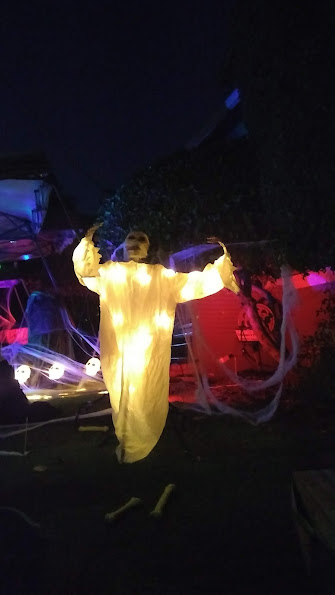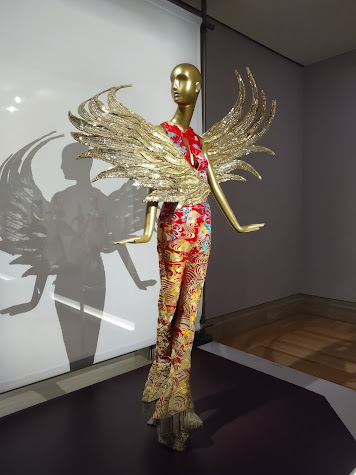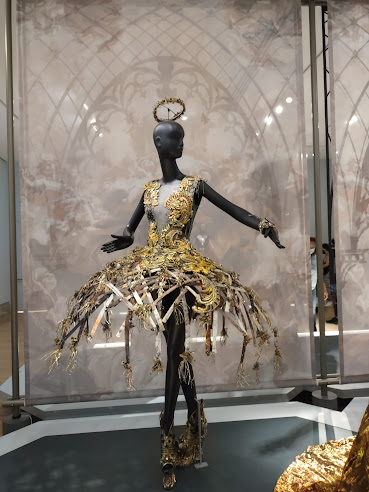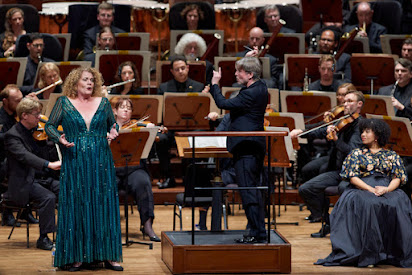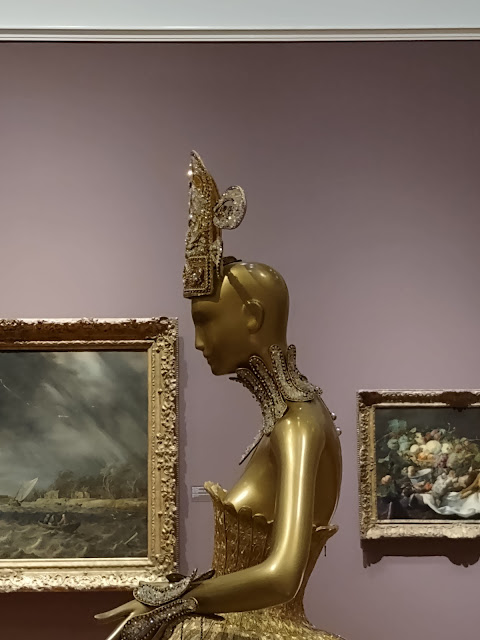Lisa Hirsch's Classical Music Blog.
The iron tongue of midnight hath told twelve. Lovers, to bed; 'tis almost fairy time.
Berce mollement sur ton sein sublime
Ô puissante mer, l’enfant de Dindyme!
Monday, October 31, 2022
Friday, October 28, 2022
Opera at the Ballpark Returns: La Traviata at Oracle Ballpark, SF
San Francisco Opera's FREE annual livecast to the ballpark returns this year, with their new production (and debuting lead singers Pretty Yende, Jonathan Tetelman, and Simone Piazzola) of Verdi's evergreen La Traviata. SFO Music Director Eun Sun Kim conducts.
Oracle Ballpark
Friday, November 11, 2022
7:30 pm
Details and signups here: You'll have to scroll just a bit because of the big video banner at the top.
Related: Pretty Yende will be featured in the next edition of In Song.
Monday, October 24, 2022
Friday, October 21, 2022
Friday Photo
Wednesday, October 19, 2022
Royal Opera Appoints Jakub Hrůša; Philippe Jordan to Leave Vienna
Well, now, here is a biggie: Jakub Hrůša will succeed Sir Antonio Pappano at the Royal Opera, Covent Garden, starting in September, 2025. He immediately takes the title Music Director Designate.
And here is another: Philippe Jordan will leave Vienna after 2025, when his contract ends. (From the November, 2022 issue of Opera.)
Open positions:
- Marin Symphony
- Indianapolis Symphony
- Sarasota Orchestra, following the death of Bramwell Tovey
- Seattle Symphony, following Thomas Dausgaard's abrupt departure in January, 2022
- Chicago Symphony Orchestra, where Riccardo Muti leaves at the end of 2022-23
- Cincinnati Symphony Orchestra: open in 2024
- Staatskapelle Dresden: open in 2024
- New York Philharmonic, when Jaap van Zweden leaves in 2024.
- Hong Kong Philharmonic, when Jaap van Zweden leaves in 2024.
- Oakland Symphony, owing to the death of Michael Morgan in August, 2021.
- Teatro Regio Turin: Open now with departure of Gianandrea Noseda. The Teatro Regio has not named a new music director.
- Minnesota Opera: Michael Christie has left. MO has not named a new music director.
- Virginia Symphony: JoAnn Falletta is now laureate, but no successor has been named.
- Shanghai Symphony Orchestra
- San Francisco Chamber Orchestra, at the end of 2022-23.
- Marin Symphony, at the end of 2022-23.
- Vienna Staatsoper, when Philippe Jordan leaves at the end of 2025.
- Osmo Vänskä
- Alasdair Neale
- Ben Simon
- Susanna Mälkki, who leaves the Helsinki Philharmonic at the end of 2023-24
- MGT (apparently does not want a full-time job, as of early 2022)
- Krzysztof Urbański
- Miguel Harth-Bedoya
- Lionel Bringuier
- Ludovic Morlot
- Sian Edwards
- Ingo Metzmacher
- Jac van Steen
- Mark Wigglesworth
- David Robertson
- Peter Oundjian
- Philippe Auguin
- Kwame Ryan
- Ilan Volkov
- Aleksandr Markovic
- Lothar Koenigs
- Henrik Nanasi
- Philippe Jordan, eventually
- Seoul Philharmonic appoints Jaap van Zweden.
- Royal Opera appoints Jakub Hrůša to succeed Antonio Pappano in September, 2025.
- Garry Walker: now full-time music director of Opera North
- Jun Markl: music director of the Malaysian Philharmonic
- Juanjo Mena: music director of the Cincinnati May Festival
- Eric Jacobsen is the new music director of the Virginia Symphony Orchestra.
- Andrés Orozco-Estrada is now music director of the Vienna Symphony Orchestra (not to be confused with the Vienna Philhamonic).
- James Gaffigan appointed Music Director of the Komische Oper in Berlin, succeeding Henrik Nanasi, who left several years ago.
- Royal Stockholm Philharmonic: Ryan Bancroft is chief conductor designate. He starts in 2023-24.
- Anja Bihlmaier is the new chief conductor of the Residentie Orchestra, The Hague.
- Dalia Stasevska is the new chief conductor of the Lahti Symphony Orchestra.
- Daniela Candillari named principal conductor of OTSL.
- Royal Concertgebouw Orchestra, where Klaus Mäkelä, now their artistic partner, becomes chief conductor in 2027.
- Jonathon Heyward becomes music director of the Baltimore Symphony, succeeding Marin Alsop. Baltimore is not in great shape; they've had terrible management and terrible financial problems, although they've also hired Mark Hanson, who is known to be competent.
- Thomas Søndergård becomes music director of the Minnesota Orchestra, succeeding Osmo Vänskä. (The NY Times can manage the umlauts in Vänskä, but not the diacriticals in Søndergård. C'mon, you can do better than that.) Two interesting things about Søndergård: he was a timpanist, unusual among conductors, who tend to be pianists; he married his partner, a baritone, less than two weeks ago. Me, I'm wondering whether he was worried that Obergefell might be overturned by the U.S. Supreme Court, given Justice Thomas's threat in Dobbs.
- Michigan Opera Theater: new principal conductor is Daniela Candillari.
- Teatro Comunale, Bologna: Oksana Lyniv becomes music director.
- Sarasota Orchestra: Bramwell Tovey becomes MD in 2022-23.
- Atlanta Symphony: Nathalie Stutzmann to succeed Robert Spano in 2022-23.
- Carlos Kalmar is now Director of Orchestral and Conducting Programs and Principal Conductor of the Cleveland Institute of Musicas well as Artistic Director and Principal Conductor of the Grant Park Music Festival in Chicago.
- Houston Synphony: Juraj Valčuha to succeed Andrés Orozco-Estrada.
- Opera de Paris: Gustavo Dudamel succeeds Philippe Jordan.
- Melbourne Symphony: Jaime Martin becomes chief conductor in 2022. Sir Andrew Davis left at the end of 2019.
- City of Birmingham Symphony Orchestra: Kazuki Yamada replaces MGT when she leaves at the end of 2021-22
- London Symphony Orchestra: Sir Antonio Pappano becomes Chief Conductor Designate in September, 2023, Chief Conductor the following year.
- Fort Worth Symphony: Robert Spano to succeed Miguel Harth-Bedoya.
- Oregon Symphony: David Danzmayr succeeds Carlos Kalmar at the beginning of the 2021-22 season.
- Scottish Chamber Orchestra: Maxim Emelyanychev has succeeded Robin Ticciati
- Orchestre de Paris: Klaus Mäkelä to succeed Daniel Harding
- Montreal Symphony Orchestra: Rafael Payare has succeeded Kent Nagano.
- Richmond Symphony: Valentina Peleggi succeeds Steven Smith.
- Singapore Symphony: Hans Graf succeeded Lan Shui.
- BBC National Orchestra of Wales: Ryan Bancroft succeeded Thomas Søndergård
- BRSO hires Sir Simon Rattle to succeed the late Mariss Jansons, effective 2023.
Geoff Nuttall
Well, gosh, here is some sad news:
Violinist Geoff Nuttall has died of pancreatic cancer at the age of 56. As the founding first-violinist of the St. Lawrence String Quartet, the Director of Chamber Music for the Spoleto Festival USA in Charleston, SC, and a Stanford University faculty member since 1998, Geoff was a deeply respected, admired, and inspirational presence in the chamber music field.
Here is the official statement from his St. Lawrence String Quartet colleagues:
With utmost sadness, today we said goodbye to our friend and colleague Geoff Nuttall. He died at age 56 with his wife Livia at his side. Geoff was an inspired artist whose loyalty to his chosen passions and people was legendary. He fought cancer as he lived his life, brimming with optimism and tirelessly showing up for the things he loved the most: spending time with his wife Livia and playing sports with his boys; collecting vinyl LP’s, building objects with his hands, and sharing the pleasures of analog experiences of all kinds; nurturing native plants and gardening; and seeking in the string quartet an ever more expansive universe of human expression. Geoff had an energetic and spiritual connection to music that rubbed off on anyone lucky enough to witness him play. He constantly inspired us to heights we never dreamed of. In his home bases here at Stanford University; at the Spoleto USA Festival in Charleston, SC; in Canada and in many other places around the world, he touched countless lives through his performances, teaching, advocacy and friendship. We will miss him every single day, but feel immensely grateful to have been his fellow traveler.
—The St. Lawrence String Quartet: Owen Dalby, Lesley Robertson, Christopher Costanza
In lieu of flowers, Geoff’s family requests a tax-deductible donation to The Geoff Nuttall Memorial Fund, which was created to advance cancer research at Stanford University. Gifts can be made online at memorial.stanford.edu by selecting “Other Stanford Designation” and entering The Geoff Nuttall Memorial Fund in the “Other” text box, or by check payable to Stanford University with The Geoff Nuttall Memorial Fund indicated on the memo line, mailed to Development Services, P.O. Box 20466, Stanford, CA 94309, or by phone at 650-725-4360.
About Geoff Nuttall
As the founding first-violinist of the St. Lawrence String Quartet, the Director of Chamber Music for the Spoleto Festival USA in Charleston, SC, and a Stanford University faculty member since 1998, Geoff was a deeply respected, admired, and inspirational presence in the chamber music field. Over the course of the Quartet’s 33-year career, he performed internationally on five continents; collaborated with celebrated composers John Adams, Osvaldo Golijov, and numerous others; and recorded Grammy-nominated and Juno award-winning albums. Also with the St. Lawrence String Quartet, Mr. Nuttall served as graduate ensemble-in-residence at the Juilliard School, Yale University, and Hartt School of Music, and served on the faculty at Stanford University, where the St. Lawrence String Quartet has been ensemble-in-residence since 1999. From 2009 until his passing, he was the Director of Chamber Music at the Spoleto Festival USA in Charleston, SC, where he brought together some of chamber music’s most beloved musicians to celebrate the art form with spontaneous collaborations, and delighted audiences with his engaging, warm and insightful introductions. He lived in the Bay Area with his wife, violinist Livia Sohn, and their two sons, Jack and Ellis.
I never met or interviewed Geoff, but I remember him vividly from the SLSQ's performances (he gyrated a bit! okay, a lot) and from his enthusiastic participation at Reactions to the Record one year, where he talked about favorite recordings, LPs, and long-gone violinists and other string players. I'm so sorry to read this news. Deepest condolences to his family, friends, and musical colleagues everywhere.
Other remembrances:
Tuesday, October 18, 2022
Dialogues of the Carmelites, San Francisco Opera
- Joshua Kosman, SF Chronicle
- Steven Winn, SFCV
- Lisa Hirsch, Opera News (to come)
- Michael Anthonio, Parterre Box
- Michael Strickland, SF Civic Center
- Opera Tattler
- Matthew Gurewitsch, Air Mail
- Richard Bammer, Vacaville Reporter
Monday, October 17, 2022
Friday, October 14, 2022
Monday, October 10, 2022
Jaap van Zweden to Seoul.
Ahem, well. After stating rather clearly that he was leaving the NY Philharmonic because the pandemic led him to reconsider his priorities, and to spend more time with his family in The Netherlands, Jaap van Zweden has accepted a post with....the Seoul Philharmonic, succeeding Osmo Vänskä, who decided not to renew his contract there. Van Zweden says that he is going there to build the orchestra, as he did in Hong Kong, a position that he is leaving when he leaves the NY Philharmonic.
Open positions:
- Marin Symphony
- Indianapolis Symphony
- Sarasota Orchestra, following the death of Bramwell Tovey
- Seattle Symphony: open right now (January, 2022)
- Cincinnati Symphony Orchestra: open in 2024
- Staatskapelle Dresden: open in 2024
- New York Philharmonic, when Jaap van Zweden leaves in 2024.
- Hong Kong Philharmonic, when Jaap van Zweden leaves in 2024.
- Oakland Symphony, owing to the death of Michael Morgan in August, 2021.
- Royal Opera, Covent Garden, when Sir Antonio Pappano leaves for the LSO in September, 2024.
- Teatro Regio Turin: Open now with departure of Gianandrea Noseda. the Teatro Regional's has not named a new music director.
- Minnesota Opera: Michael Christie has left. MO has not named a new music director.
- Virginia Symphony: JoAnn Falletta is now laureate, but no successor has been named.
- Shanghai Symphony Orchestra
- San Francisco Chamber Orchestra, at the end of 2022-23.
- Marin Symphony, at the end of 2022-23.
- Osmo Vänskä
- Alasdair Neale
- Ben Simon
- Susanna Mälkki, who leaves the Helsinki Philharmonic at the end of 2023-24
- Jaap van Zweden, who leaves the NY Phil at the end of 2023-24
- MGT (apparently does not want a full-time job, as of early 2022)
- Krzysztof Urbański
- Miguel Harth-Bedoya
- Lionel Bringuier
- Ludovic Morlot
- Sian Edwards
- Ingo Metzmacher
- Jac van Steen
- Mark Wigglesworth
- David Robertson
- Peter Oundjian
- Philippe Auguin
- Kwame Ryan
- Ilan Volkov
- Aleksandr Markovic
- Lothar Koenigs
- Henrik Nanasi
- Garry Walker: now full-time music director of Opera North
- Jun Markl: music director of the Malaysian Philharmonic
- Juanjo Mena: music director of the Cincinnati May Festival
- Eric Jacobsen is the new music director of the Virginia Symphony Orchestra.
- Andrés Orozco-Estrada is now music director of the Vienna Symphony Orchestra (not to be confused with the Vienna Philhamonic).
- James Gaffigan appointed Music Director of the Komische Oper in Berlin, succeeding Henrik Nanasi, who left several years ago.
- Royal Stockholm Philharmonic: Ryan Bancroft is chief conductor designate. He starts in 2023-24.
- Anja Bihlmaier is the new chief conductor of the Residentie Orchestra, The Hague.
- Dalia Stasevska is the new chief conductor of the Lahti Symphony Orchestra.
- Daniela Candillari named principal conductor of OTSL.
- Royal Concertgebouw Orchestra, where Klaus Mäkelä, now their artistic partner, becomes chief conductor in 2027.
- Jonathon Heyward becomes music director of the Baltimore Symphony, succeeding Marin Alsop. Baltimore is not in great shape; they've had terrible management and terrible financial problems, although they've also hired Mark Hanson, who is known to be competent.
- Thomas Søndergård becomes music director of the Minnesota Orchestra, succeeding Osmo Vänskä. (The NY Times can manage the umlauts in Vänskä, but not the diacriticals in Søndergård. C'mon, you can do better than that.) Two interesting things about Søndergård: he was a timpanist, unusual among conductors, who tend to be pianists; he married his partner, a baritone, less than two weeks ago. Me, I'm wondering whether he was worried that Obergefell might be overturned by the U.S. Supreme Court, given Justice Thomas's threat in Dobbs.
- Michigan Opera Theater: new principal conductor is Daniela Candillari.
- Teatro Comunale, Bologna: Oksana Lyniv becomes music director.
- Sarasota Orchestra: Bramwell Tovey becomes MD in 2022-23.
- Atlanta Symphony: Nathalie Stutzmann to succeed Robert Spano in 2022-23.
- Carlos Kalmar is now Director of Orchestral and Conducting Programs and Principal Conductor of the Cleveland Institute of Musicas well as Artistic Director and Principal Conductor of the Grant Park Music Festival in Chicago.
- Houston Synphony: Juraj Valčuha to succeed Andrés Orozco-Estrada.
- Opera de Paris: Gustavo Dudamel succeeds Philippe Jordan.
- Melbourne Symphony: Jaime Martin becomes chief conductor in 2022. Sir Andrew Davis left at the end of 2019.
- City of Birmingham Symphony Orchestra: Kazuki Yamada replaces MGT when she leaves at the end of 2021-22
- London Symphony Orchestra: Sir Antonio Pappano becomes Chief Conductor Designate in September, 2023, Chief Conductor the following year.
- Fort Worth Symphony: Robert Spano to succeed Miguel Harth-Bedoya.
- Oregon Symphony: David Danzmayr succeeds Carlos Kalmar at the beginning of the 2021-22 season.
- Scottish Chamber Orchestra: Maxim Emelyanychev has succeeded Robin Ticciati
- Orchestre de Paris: Klaus Mäkelä to succeed Daniel Harding
- Montreal Symphony Orchestra: Rafael Payare has succeeded Kent Nagano.
- Richmond Symphony: Valentina Peleggi succeeds Steven Smith.
- Singapore Symphony: Hans Graf succeeded Lan Shui.
- BBC National Orchestra of Wales: Ryan Bancroft succeeded Thomas Søndergård
- BRSO hires Sir Simon Rattle to succeed the late Mariss Jansons, effective 2023.
Museum Mondays
Friday, October 07, 2022
Three Strikes and You're Out, Gene.
I've now seen three different productions, with three different casts and conductors, of Tchaikovsky's Eugene Onegin, and three times I have walked out scratching my head. The opera is popular, beloved, widely performed inside and outside Russia, and yet it continues to leave me cold.
I certainly understand it much better now than I did when I was younger: the typical infatuation of a teenager with a sophisticated older man, his turning her down (wisely, but badly), his years-later love for her, her maturity and desire to stay in her stable marriage though she still loves Onegin. There just won't be a "happy ending" here, not any more than in Tosca. And the music, really, is masterly, beautiful, well-put-together, autumnal. Tchaikovsky knew what he was doing.
Friends clued me in to why I haven't been wowed by the opera: a series of competent baritones singing Onegin who just aren't compelling enough to persuade me that Tatyana would be instantly infatuated. To name them: Anthony Michaels-Moore in 1997 (I do not think that I saw David Okerlund...), Russell Braun in 2004, and now Gordon Bintner.
I will own that it's possible that one issue is that for all of these performances, I was pretty far from the stage: in the balcony in 1997 and 2004, in the dress circle this year. But the singers playing Olga, Lensky, and Filipyevna came across loud and clear, vocally and emotionally, this year, and so I'm going to blame Michaels-Moore, Braun, and Bintner for smaller-than-life performances in a role that needs a big performance.
My various friends have also pointed me to readily available video performances with baritones who are know to me personally to be compelling: Dmitri Hvorostovsky, native speaker of Russian and a great singer in that language; Marius Kwiecien, magnificent all three times I saw him live; Peter Mattei, who is so compelling that he can steal the show as Count Almaviva in Nozze di Figaro, and as Amfortas. So I will check out one or the other of those, or maybe all three. The Met performance with Hvorostovsky is in the same Robert Carsen production we have in SF right now.
So you know what I think of Bintner. Evgenia Muraveva, like Bintner making her house debut, was similarly small in stature. I was not particularly convinced by her infatuation and she sounded wiry in the first two acts. She definitely sounded better in Act III, fuller-voiced, matching the character's maturity, and her whole style of movement definitely changed from "provincial country girl" to "sophisticated cosmopolitan rich lady." That change was impressive. But the earlier acts, not so much.
The real stars of the show, for me, were mezzo Aigul Akhmetshina, as Olga, and Evan LeRoy Johnson as Lensky. Whatever it is that you need to make an impression, they had it, in spades. Akhmetshina has got a beautiful, vibrant, easily-produced sound, and you know, I could say exactly the same thing about Johnson, who has a lovely lyric tenor. I was also convinced by their acting. (Looking at photos of Akhmetshina, hmm, she looks a little like a dark-haired Karita Mattila.) And Ronnita Miller was a marvelous Filipyevna; can't we get her in a big, juicy role some time? She was a fine Erda, who has about fifteen minutes of stage time in the Ring, and she is great in this, and, well, give her a big role!
I understand that there've been mixed reactions to the Carsen production. This is a famous production; it was initially not all that popular at the Met, where it originated, but by the time the Met abandoned it, it had become a favorite. (Is this similar to Hans Neuenfeld's famous "rat" Lohengrin at Bayreuth, which went from being booed to getting a 20 minute standing o at its last performance, which I know because I was there, and yes, it was a great production.) So I was very curious about it.
Well, for me, it's a mixed bag. I think that the first act first scene, on a very bare stage with lots of leaves falling and drifting about, works perfectly well. The long second scene is in Tatyana's bedroom and there is some odd perspective there, with a door in the floor. Okay, so her bedroom is in the attic? Or something? And the second act, scene 1 at the ball, sure. It's not great, but it's okay. I will mention that Brenton Ryan, who is a terrific Eros in Antony and Cleopatra, seems miscast as Monsieur Triquet; the role doesn't sit quite right for him.
The big BIG problem is the transition from Act II to Act III. This production runs the acts together, or maybe SFO decided to run them together? I could ask but I haven't. The duel takes place; Lensky dies at the back of the stage. Stagehands remove him, Onegin stands dead center as the lighting changes to something indoors and bright. And....dressers change Onegin from his dueling clothes into ballroom formal, all of this while the big polonaise that opens act III plays, but it's just three or four people on stage, Bintner and the dressers, and nobody is dancing.
The last SFO production also had no dancing during this passage. Instead, it had the chorus (I guess?) all dressed up, with the women kneeling on the floor while the music played. I don't get it. It's dance music! Put dancing people on stage! I know you can do it!
The very last scene is fine: a nice chair, a bare stage, a couple of somewhat tortured people whose timing was way off. Maybe in another life they could have been happy, but not in this one.
- Joshua Kosman, SF Chronicle
- Janos Gereben, SFCV
- Opera Tattler
- Michael Anthonio, Parterre Box ("Love Me or Leaf Me" ahahaha)
Articles of Interest
I've been meaning to link to these forever.
- After the Sheng Fiasco, Music and Arts Education Can No Longer Profess Color Blindness, by Loren Kajikawa, Daniel Martinez Hosang. AMS/Musicology Now.
- Confronting Our Complicity: Music Theory and White Supremacy, by Dave Molk. New Music USA
- Music Theory and the White Racial Frame, by Dr. Philip Ewell, MTO
- Journal of Schenkerian Studies: Proving the Point, by Dr. Megan Lavengood
- Black Scholars Confront White Supremacy in Classical Music, by Alex Ross, The New Yorker
Monday, October 03, 2022
San Francisco Symphony: Salonen/Mahler 2, Weston Push
- Joshua Kosman, SF Chron
- Lisa Hirsch, SFCV
- Thomas May, CVNA

